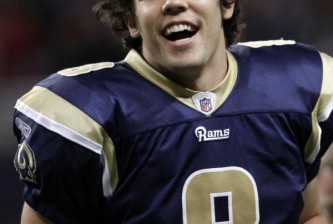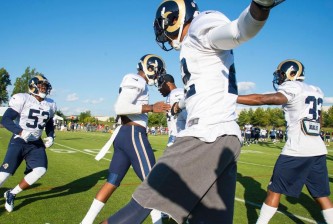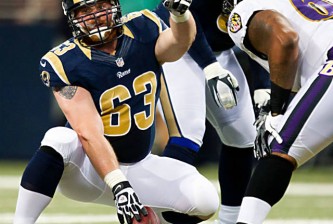
The stat line for Richie Incognito is going to be ugly. He racked up 35 yards in penalties, most coming on two unnecessary roughness calls where he found himself still finishing his block against Brandon Mebane. Each of his three penalties killed a drive, or at least significantly contributed to its failure. After his second 15-yard penalty, Coach Spagnuolo sent in Adam Goldberg to replace him, setting up a sideline confrontation that Rams fans everywhere were salivating for.
Richie yanked off his helmet, and started yapping, but stood deferentially behind the coach, suggesting he was bitching about the referees, about Mebane, or about the candy-ass league and its boo-hoo penalties, rather than bitching about being benched.
Spagnuolo did not get in his face, nor even appear to raise his voice. Instead, he put an arm around Richie, and gave him a few words, then patted him on the gut and sent him to the bench. Minutes later, he was back in the game. On the plus side, he didn’t register a penalty the rest of the way. On the minus side, the game was already all but over.
For Incognito, Sunday’s antics represent a series of all-too-familiar events. Stupid plays, followed by temporary contrition, followed by keeping his nose clean for a short period of time. But for Spagnuolo? How much leeway will he give a player in hopes of turning him into a solid citizen? It’s a question that was asked twelve years ago….
In reading Peter King’s 1997 article on Dick Vermeil’s return to coaching in St Louis, after a 15 year hiatus, one of the troubling themes throughout was Vermeil’s steadfast dedication to Lawrence Phillips. Vermeil saw untapped talent, if only he could reach the player by filling a vacuum of fatherly guidance in Phillips’ life. But throughout the season, Phillips refused to be reached.
Quoting King, from the preseason:
“Crampin’ up, Coach,” Phillips says.
“Now, Lawrence,” Vermeil says, “you know that wouldn’t have happened if you’d worked out as hard in the last month of the off-season as you did the rest of the time.”
“Had to take care of business, Coach,” Phillips says quietly, seated at his locker.
Vermeil bends down and puts his hands on Phillips’s shoulders and his mouth four inches from the player’s ear. “The only business you have to take care of now.” he says in a near whisper, “is being the best football player you can be.”
But while Vermeil worked hard to instill a toughness during the preseason, insisting on punishing physical drills, full-contact practices and workouts in full pads, he fell short of creating a “tough love” relationship with Phillips. From King again, describing the locker room after a game 1 triumph over the hated New Orleans Saints:
“Gimme the ball,” he says, palming the game ball. “Game ball goes to one man. I’m so proud of this guy. He’s been through so much. I’ve been to jail with him, and we’ve talked about everything. Now his life’s turning around. It’s all looking up for him now…. Lawrence Phillips!”
The players pump their fists and yell “WOO-WOO-WOO!” All eyes are on Phillips. He takes the ball, casts his glance toward the floor and mumbles, “Can’t do it without the linemen.” That’s it. Phillips turns and goes back to his locker. Vermeil can’t believe how the kid threw a wet blanket over the moment.
Just like that, the optimism is gone.
The 1997 Rams lost 10 of their next 11 games. Phillips never repeated his game 1 heroics, and now Vermeil had a player whose attitude and performance was not just worthless, but self-destructive. But Vermeil’s ethos at the time was to stick by his players through the tough times. Ten weeks into the season, with his Rams 2-8, Vermeil still refused to adopt the “Bill Parcells philosophy.”
Ultimately, Phillips’ antisocial behavior forced the coach into a corner — stick with Phillips and likely never win another game, and have his coaching comeback abruptly ended … or bench him.
The coach sees no difference in Phillips’s demeanor. He doesn’t get the apology he wanted. Finally, he says, “Lawrence, tell me something. What would you do if you were me?”
Phillips thinks for a moment. “Coach,” he says, “I’d cut me.”
That’s exactly what happens, and the ’97 Rams — still a team with major talent holes and question marks — responds by winning 3 of its final 5 games.
Spagnuolo inherited a team that is not markedly different from that Rams team of 12 years ago … talent-poor, and prone to a lot of stupid mistakes. He has attempted to instill an aura of toughness and discipline, but the team utterly failed its first test of discipline. And it wasn’t just Incognito — Donnie Avery had a terrible fumble on the game’s first play, and an incredibly bad blocking penalty that wiped out a 20+ yard run by Steven Jackson. The defense suffered a major breakdown in allowing a 62-yard Julius Jones touchdown, in which he wasn’t touched until he was at the goal line. Bulger routinely stared down his first option and had to burn timeouts on consecutive plays, well outside of the cauldron of Seattle’s red zone.
The thing that remains to be seen is whether Spagnuolo holds certain players — “project” players like Incognito — to different standards than others. It’s one thing for a coach to have a doghouse. But it can kill a team when a coach plays favorites.
{democracy:5}






















